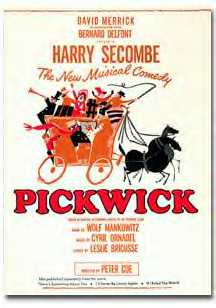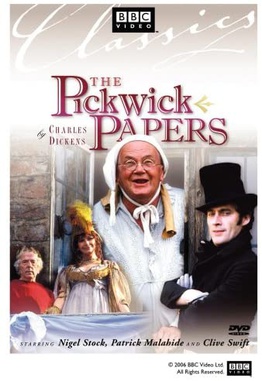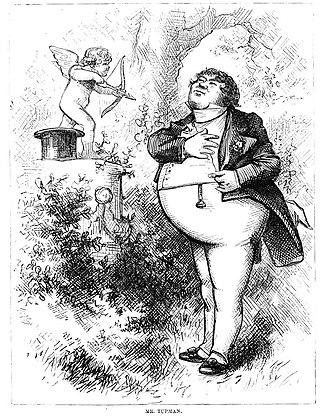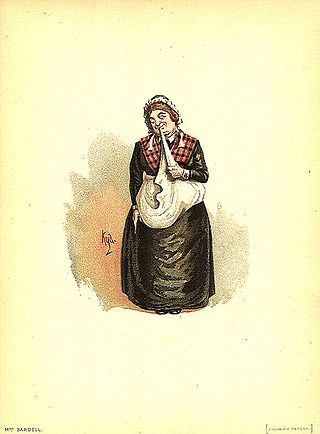
Sam Weller is a fictional character in The Pickwick Papers (1836), the first novel by Charles Dickens, and the character that made Dickens famous. A humorous Cockney bootblack, Sam Weller first appeared in the fourth serialised episode. Previously the monthly parts of the book had been doing badly, selling only about 1,000 copies a month — but the humour of the character transformed the book into a publishing phenomenon, raising the sales by late autumn of 1837 to 40,000 a month.

The Posthumous Papers of the Pickwick Club was the first novel by English author Charles Dickens. His previous work was Sketches by Boz, published in 1836, and his publisher Chapman & Hall asked Dickens to supply descriptions to explain a series of comic "cockney sporting plates" by illustrator Robert Seymour, and to connect them into a novel. The book became a publishing phenomenon, with bootleg copies, theatrical performances, Sam Weller joke books, and other merchandise. On its cultural impact, Nicholas Dames in The Atlantic writes, "'Literature' is not a big enough category for Pickwick. It defined its own, a new one that we have learned to call 'entertainment'." The Pickwick Papers was published in 19 issues over 20 months, and it popularised serialised fiction and cliffhanger endings.

Augustus Snodgrass is a fictional character in Charles Dickens's first novel, The Pickwick Papers (1836). He considers himself a Romantic poet, though there is no mention of any of his own poetry in the novel.

Samuel Pickwick is a fictional character and the main protagonist in The Pickwick Papers (1836), the first novel by author Charles Dickens. One of the author's most famous and loved creations, Pickwick is a retired successful businessman and is the founder and chairman of the Pickwick Club, a club formed to explore places remote from London and investigate the quaint and curious phenomena of life found there.

Pickwick is a musical with a book by Wolf Mankowitz, music by Cyril Ornadel, and lyrics by Leslie Bricusse. Based on the 1837 novel The Pickwick Papers by Charles Dickens, it is set in and around London and Rochester in 1828.
William Thomas Moncrieff, commonly referred as W. T. Moncrieff, was an English dramatist and author.

Nathaniel Winkle is a fictional character in Charles Dickens's first novel, The Pickwick Papers (1836).
The bibliography of Charles Dickens (1812–1870) includes more than a dozen major novels, many short stories, several plays, several non-fiction books, and individual essays and articles. Dickens's novels were serialized initially in weekly or monthly magazines, then reprinted in standard book formats.

The Pickwick Papers is a 1952 British historical comedy drama film written and directed by Noel Langley and starring James Hayter, James Donald, Nigel Patrick and Joyce Grenfell. It is based on the Charles Dickens’s 1837 novel of the same name. It was made by Renown Pictures who had successfully released another Dickens adaptation Scrooge the previous year.

The Pickwick Papers is a twelve-part BBC adaptation of the 1837 novel The Pickwick Papers by Charles Dickens. The series was first broadcast in 1985. It starred Nigel Stock, Alan Parnaby, Clive Swift and Patrick Malahide, with narration by Ray Brooks.

Alfred Jingle is a fictional character who appears in the 1837 novel The Pickwick Papers by Charles Dickens. He is a strolling actor and an engaging charlatan and trickster noted for his bizarre anecdotes and distinctive mangling of English syntax.
The Adventures of Mr. Pickwick is a 1921 British silent comedy film directed by Thomas Bentley based on the 1837 novel The Pickwick Papers by Charles Dickens. As of August 2010, the film is missing from the BFI National Archive, and is listed as one of the British Film Institute's "75 Most Wanted" lost films.

Mary Merrall, born Elsie Lloyd, was an English actress whose career of over 60 years encompassed stage, film and television work.

Pickwick is a British television musical made by the BBC in 1969 and based on the 1963 stage musical Pickwick, which in turn was based on the 1837 novel The Pickwick Papers written by Charles Dickens. It stars Harry Secombe as Samuel Pickwick and Roy Castle as Sam Weller.

The Pickwick Papers is a 1913 three-reel silent film based on the 1837 novel of the same name by Charles Dickens. The film was produced by Vitagraph Studios and features John Bunny in the title role of Samuel Pickwick.

Tracy Tupman is a fictional character in Charles Dickens's first novel, The Pickwick Papers (1836). Although fat and middle-aged he considers himself a young lover and has an unfortunate amorous entanglement with the spinster Rachael Wardle.

William John Hammond was a British actor-manager and singer of comic songs of the early 19th-century. He played Sam Weller in Samuel Weller, or, The Pickwickians in 1837.

Mrs Martha Bardell is a fictional character in The Pickwick Papers (1836), the first novel by Charles Dickens. A widow and the landlady of Mr Pickwick, a romantic misunderstanding between the two results in one of the most famous fictional legal cases in English literature, Bardell v. Pickwick, leading to them both being incarcerated in the Fleet Prison for debt.
George Cooke was an English actor.



















